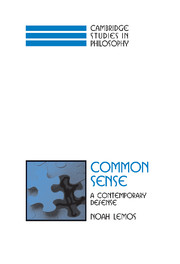Book contents
- Frontmatter
- Contents
- Acknowledgments
- Preface
- 1 The Common Sense Tradition
- 2 Common Sense and Reliability I
- 3 Common Sense and Reliability II
- 4 Reid, Reliability, and Reid's Wrong Turn
- 5 Moore, Skepticism, and the External World
- 6 Chisholm, Particularism, and Methodism
- 7 Common Sense and A Priori Epistemology
- 8 Particularism, Ethical Skepticism, and Moral Philosophy
- Conclusion
- Selected Bibliography
- Index
5 - Moore, Skepticism, and the External World
Published online by Cambridge University Press: 22 August 2009
- Frontmatter
- Contents
- Acknowledgments
- Preface
- 1 The Common Sense Tradition
- 2 Common Sense and Reliability I
- 3 Common Sense and Reliability II
- 4 Reid, Reliability, and Reid's Wrong Turn
- 5 Moore, Skepticism, and the External World
- 6 Chisholm, Particularism, and Methodism
- 7 Common Sense and A Priori Epistemology
- 8 Particularism, Ethical Skepticism, and Moral Philosophy
- Conclusion
- Selected Bibliography
- Index
Summary
It is sometimes charged that Moore and other philosophers in the common sense tradition do not take skepticism seriously. Certainly, they do not take skepticism seriously in the sense that they are skeptics. Still, it would be a mistake to hold that they do not address skeptical arguments or positions. Moore's responses to skepticism are well-known, though many philosophers think them unsatisfactory. In the first section of this chapter, I focus on Moore's proof of an external world and the charge that it is question begging. In the second, I look at Moore's response to skepticism and Stroud's criticism of it. In the third, I look at the “sensitivity requirement” prominent in recent relevant alternative and contextualist accounts of knowledge.
MOORE'S PROOF AND THE CHARGE OF QUESTION-BEGGING
Kant tells us that it is a scandal to philosophy that the existence of things outside of us must be accepted merely on faith. In his “Proof of an External World,” Moore gives a simple argument that has perplexed, or vexed, many philosophers. Moore thinks that our belief in external objects is not a matter of mere faith, but something that we know and, as the title of his paper suggests, can be proved. After pages of careful Moorean exploration of such distinctions as “being presented in space” and “being met with in space,” Moore offers his proof. It is, in brief:
Here is one hand.
Here is another hand.
Therefore, there are external objects.
- Type
- Chapter
- Information
- Common SenseA Contemporary Defense, pp. 85 - 104Publisher: Cambridge University PressPrint publication year: 2004



